人教版八年级上册英语 Unit 1 Where did you go on vacation单元检测
人教版八年级上册英语知识点汇总资料
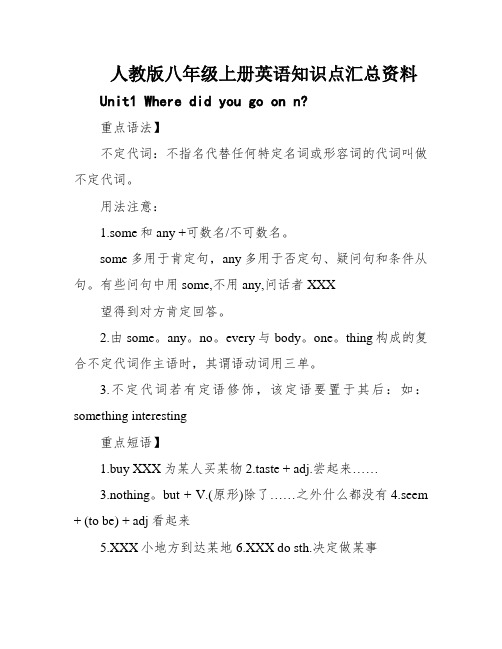
人教版八年级上册英语知识点汇总资料Unit1 Where did you go on n?重点语法】不定代词:不指名代替任何特定名词或形容词的代词叫做不定代词。
用法注意:1.some和any +可数名/不可数名。
some多用于肯定句,any多用于否定句、疑问句和条件从句。
有些问句中用some,不用any,问话者XXX望得到对方肯定回答。
2.由some。
any。
no。
every与body。
one。
thing构成的复合不定代词作主语时,其谓语动词用三单。
3.不定代词若有定语修饰,该定语要置于其后:如:something interesting重点短语】1.buy XXX为某人买某物2.taste + adj.尝起来……3.nothing。
but + V.(原形)除了……之外什么都没有4.seem + (to be) + adj看起来5.XXX小地方到达某地6.XXX do sth.决定做某事7.XXX.尝试做某事/ try to do sth.尽力做某事8.XXX喜欢做某事9.want to do sth.想去做某事10.start XXX开始做某事=XXX.11.XXX停止做某事区分。
to do sth.停下来去做某事12.XXX XXX.不喜爱做某事14.so + adj + that +从句云云……以至于……16.tell sb。
(not) to do sth.告诉或人(不要)做某事17.keep XXX.连续做某事18.XXX.遗忘去做某事XXX遗忘做过某事词语辨析】1.XXX照相quite a few+名词复数“许多…”2.XXX形容词看起来…。
You seem happy today.XXX.好像XXX仿佛做某事I seem to have a coldIt seems +从句似乎。
….It XXX.seem like。
好像,似乎…。
It seems like a good idea.XXX小地点注:若后跟地点副词XXX,介词需省略,如:arrive here。
人教版八年级上册英语Unit 1 Where did you go on vacation?

Unit1 Where did you go on vacation第一课时Section A(1a-1c&2d)一、教材分析本单元教材以Where did you go on vacation?为中心话题,围绕着描述“过去发生的事情”展开,学习和运用一般过去时态的一般疑问句Did you go/see/buy...?和特殊疑问句Where/What/How...?询问过去的事件,让学生学会谈论和分享过去发生的事件。
Section A的主要学习内容是:复习一般过去时态和动词的规则与不规则变化,学习一般过去时态的一般疑问句:Did you...?及不定代词的用法。
Section A安排了许多听力任务活动,所以教师为了充分调动学生参与的积极性,提高学生的听说读写各方面的能力,不让课堂显得单调无味,特将2d调到本节课课进行教学,把2a&2d调到下节课进行教学。
二、学情分析学生在以前所学的内容当中已经学过一般过去时态和动词过去式规则及不规则变化,但仅仅是有所接触而已,对于过去式的掌握还需要一定的强化,因此,本课的目标语言就变为本课的难点了。
在解决这一问题上,让学生通过“情景教学、看图说话、小组对话以及听力训练”的方法、经过反复练习的方法,让其达到掌握并运用的目的。
三、教学目标通过加强一般过去时态的一般疑问句Didyou go...?和特殊疑问句,以及不规则动词的运用和复习巩固,更进一步让学生学会谈论过去的事情。
四、教学重点和难点Teaching Key Points(教学重点)New York City,Central Park,few,most,quite a few,on vacation Target language:?I/They/He/She went to the mountains/New YorkCity/summer camp/the beach. Did you...?Yes,I did./No,I didn't.Teaching Difficult Points(教学难点)Use the target language above to talk about past events.五、情感态度价值观:进行未成年人外出不乘坐三无车辆,不骑自行车、摩托车等方面的安全教育,培养孩子关爱自己,关爱他人,珍爱生命的情感态度价值观。
新2024秋季八年级英语上册人教版Unit1Wheredidyougoonvacation?听课记录

新2024秋季八年级人教版英语上册Unit 1 Where did you go on vacation? 听课记录一、教学目标(核心素养)•语言能力:学生能够流利地使用一般过去时描述自己的假期经历,包括地点、活动和感受。
•思维品质:通过对比不同学生的假期经历,培养学生的批判性思维和创新能力。
•文化意识:增进对不同旅游文化的了解,培养学生的跨文化交流能力。
•学习能力:通过合作学习,提高学生自主学习和解决问题的能力。
二、导入教师行为:•教师展示一系列关于世界各地风景名胜的图片,每张图片都配以简短的英文描述。
•提问:“Which place do you like best? Why? Have you ever been there or dream of going there?” 引导学生分享自己的喜好和旅行愿望。
•引出话题:“Many of us have wonderful memories of our vacations.Today, let's share our stories and learn about others' experiences.”学生活动:•学生认真观看图片,积极思考并回答教师的问题。
•部分学生分享了自己的旅行经历或梦想中的旅行目的地,激发了课堂气氛。
过程点评:•图片导入直观生动,有效激发了学生的学习兴趣和参与度。
•通过分享个人经历,学生自然地进入了学习状态,为后续的学习活动做了良好的铺垫。
三、教学过程(一)词汇预热教师行为:•在黑板上列出与假期旅行相关的词汇,如“vacation”, “beach”, “mountain”,“visit”, “enjoy”等,并领读几遍。
•通过快速问答的方式,检查学生对这些词汇的理解和掌握情况。
学生活动:•学生跟读词汇,并尝试在脑海中构建与这些词汇相关的场景。
•积极参与快速问答,展示自己的词汇掌握情况。
过程点评:•词汇预热为后续的阅读和写作活动打下了坚实的基础。
初中英语人教版八年级上册Unit 1 Where did you go on vac

anyone, anywhere, wonderful, few, quite a few, most, most of time, Huangguoshu Waterfall, Central Park
• Where did you go on vacation? I went to the mountains. • Did you go with anyone? Yes, I did. No, I didn’t. • Did you do anything special last month? • Huangguoshu Waterfall is very wonderful, so I took quite a few photos.
根据汉语完成英语句子。 1. Brad played sports __________ ________ __________ (大多数时间) last weekend. 2. Did you buy ____________ ______________(一些特别的东西) in India? 3. Li Ming took ____________ __________ ___________ (相当多) photos in Guizhou. 4. Hi, Helen. ________ _______ ________ __________. (好久不见了). 5. Did Julie go out _____________ _____________(和任何人一起)? 6. Did you go _____________ ______________(任何有趣的地方)? 7. Grace went to ____________ ____________ (中央公园) in NewYork City. 8. I was __________ __________ (在度假) last month.
人教版英语八年级上第一单元Unit1Wheredidyougoonvacation知识点梳理

人教版英语八年级上第一单元Unit1Wheredidyougoonvacation知识点梳理Unit 1 Where did you go on vacation?知识梳理一、词型转换Section A1.wonder →(adj.) wonderful2.I →(反身代词) myself3.you →(反身代词) yourself4.yourself →(pl.) yourselves5.seem →(pt.) seemedSection B1.activity →(pl.) activities2.decide →(n.) decision3.try →(pt.) tried4.bike →(同义词) bicycle5.build →(n.) building6.difference →(adj.) different7.like →(反义词) dislike8.below →(反义词) above二、短语归纳Section A1.go to Central Park 去中央公园2.on vacation 在度假3.buy something special 买特别的东西4.meet someone interesing 遇见有趣的人5.go out with someone 和某人一起出去6.take quite a few photos 拍相当多的照片7.most of the time 大多数时间8.go shopping 去购物9.keep a diary 记日记10.of course 当然;自然Section B1.have a good time 玩得高兴;过得愉快2.go to the beach 去海滩3.feel like 感觉像4.the houses of the Chinese traders 中国商人的房子5. a lot of new buildings 许多新的建筑物6.in the past 在过去7.over an hour 一个多小时8.too many people 太多的人9.get to the top 到达顶部10.because of the bad weather 因为不好的天气11.one bowl of fish 一碗鱼肉12.another two hours 另外两个小时13.the top of the hill 山顶14.learn something important 学习重要的东西Self Check1.go to the countryside 去乡下2.in the shopping center 在购物中心3.have a fun time 玩得高兴;过得愉快4.after three hours 三个小时以后5.keep going 一直走6.twenty minutes later 20分钟后重点句子1.Where did you go on vacation?你去哪儿度假的?2.Long time no see.好久不见。
人教版八上Unit1 Where did you go on vacation 知识点
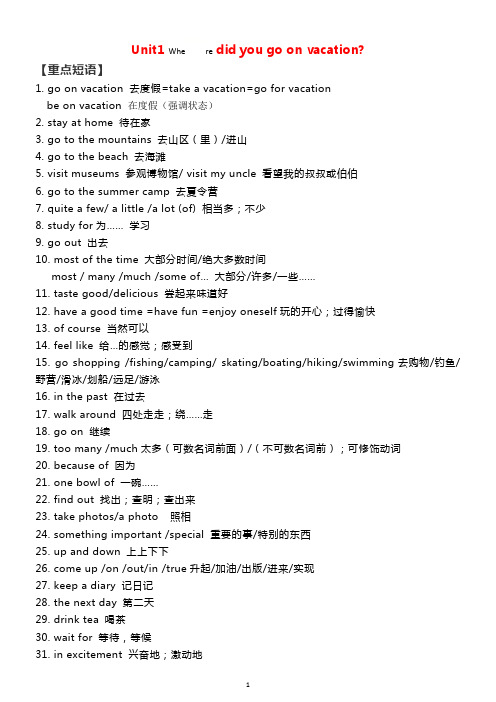
Unit1 Whe re did you go on vacation?【重点短语】1. go on vacation 去度假=take a vacation=go for vacationbe on vacation 在度假(强调状态)2. stay at home 待在家3. go to the mountains 去山区(里)/进山4. go to the beach 去海滩5. visit museums 参观博物馆/ visit my uncle 看望我的叔叔或伯伯6. go to the summer camp 去夏令营7. quite a few/ a little /a lot (of) 相当多;不少8. study for为……学习9. go out 出去10. most of the time 大部分时间/绝大多数时间most / many /much /some of…大部分/许多/一些……11. taste good/delicious 尝起来味道好12. have a good time =have fun =enjoy oneself玩的开心;过得愉快13. of course 当然可以14. feel like 给…的感觉;感受到15. go shopping /fishing/camping/ skating/boating/hiking/swimming去购物/钓鱼/野营/滑冰/划船/远足/游泳16. in the past 在过去17. walk around 四处走走;绕……走18. go on 继续19. too many /much太多(可数名词前面)/(不可数名词前);可修饰动词20. because of 因为21. one bowl of 一碗……22. find out 找出;查明;查出来23. take photos/a photo 照相24. something important /special 重要的事/特别的东西25. up and down 上上下下26. come up /on /out/in /true升起/加油/出版/进来/实现27. keep a diary 记日记28. the next day 第二天29. drink tea 喝茶30. wait for 等待,等候31. in excitement 兴奋地;激动地32. bring back… from 从……带回33. feed the hens 喂鸡34. 100 years ago 100年前35. another two hours = two more hours 另外两小时36. along the way 沿途37. from the top of 从……顶部38. for oneself 为某人自己/亲自39. go to the countryside /in the countryside 去乡下/在乡下40. the only problem 唯一的问题41. Bye for now!= Just stop here! 就此止笔!到此为止!42. arrive in+大地点/ at+ 小地点=get to / reach到达某地43. a really old place 一个很古老的地方44. not so/as…as 不如……45. start raining a little 开始下小雨46. That’s not all. 还不止这些。
(完整版)新人教版八年级英语上册unit1知识点总结

Unit 1 where did you go on vacation ➢单词复习:任何人Anywhere 精彩的;极好的最多的;大多数的没有什么n.没有。
每人;人人.我自己你自己;你亲自hen pig似乎;好像无聊的;厌烦的;郁闷的Someone Diary 活动;活跃。
决定;选定Paragliding bird bicycle building trader惊奇;想知道;怀疑差异;不同顶部;顶等;等待湿的;雨天的低于;在。
..下面饥饿的;渴望的如同;像.。
一样HillDuck不喜欢;厌恶短语归纳1、go on vacation去度假 ,2、stay at home 呆在家,3、go to the mountains 上山/进山,4、go to the beach到海边去,5、visit museums 参观博物馆,6、go to summer camp 去夏令营,7、quite a few 相当多,8、study for为……学习,9、go out 出去,10、most of the time 大部分时间/绝大多数时间,11、taste good 尝起来味道好,12、have a good time玩的开心,13、of course当然可以,14、feel like(doing sth)感觉像……/想要,15、go shopping购物,16、in the past 在过去,17、walk around绕……走,18、too many 太多(可数名词前面),19、because of 因为,20、one bowl of 一碗……,21、find out 查出来/发现,22、go on继续,23、take photos 照相,24、something important重要的事情,25、up and down上上下下,26、come up出来➢习惯用法、搭配1. buy sth。
for sb.=buy sb. sth。
八年级英语上册 unit 1 where did you go on vacation(短语+句型+练习)(新版)人教新目标版
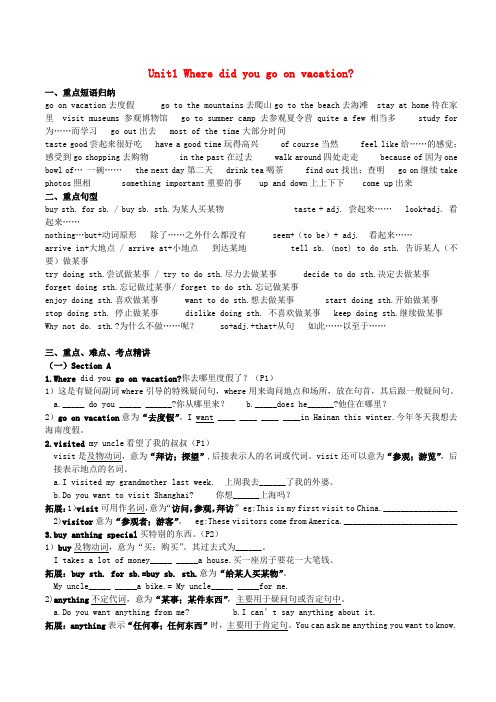
Unit1 Where did you go on vacation?一、重点短语归纳go on vacation去度假 go to the mountains去爬山go to the beach去海滩 stay at home待在家里 visit museums 参观博物馆 go to summer camp去参观夏令营quite a few相当多 study for 为……而学习 go out出去 most of the time大部分时间taste good尝起来很好吃 have a good time玩得高兴 of course当然 feel like给……的感觉;感受到go shopping去购物 in the past在过去 walk around四处走走 because of因为one bowl of…一碗…… the next day第二天 drink tea喝茶 find out找出;查明 go on继续take photos照相 something important重要的事 up and down上上下下 come up出来二、重点句型buy sth. for sb. / buy sb. sth.为某人买某物 taste + adj. 尝起来…… look+adj. 看起来……nothing…but+动词原形除了……之外什么都没有 seem+(to be)+ adj. 看起来……arrive in+大地点 / arrive at+小地点到达某地 tell sb. (not) to do sth. 告诉某人(不要)做某事try doing sth.尝试做某事 / try to do sth.尽力去做某事 decide to do sth.决定去做某事forget doing sth.忘记做过某事/ forget to do sth.忘记做某事enjoy doing sth.喜欢做某事 want to do sth.想去做某事 start doing sth.开始做某事stop doing sth. 停止做某事 dislike doing sth. 不喜欢做某事 keep doing sth.继续做某事Why not do. sth.?为什么不做……呢? so+adj.+that+从句如此……以至于……三、重点、难点、考点精讲(一)Section A1.Where did you go on vacation?你去哪里度假了?(P1)1)这是有疑问副词where引导的特殊疑问句,where用来询问地点和场所,放在句首,其后跟一般疑问句。
人教新目标八年级英语上册Unit1Wheredidyougoonvacation知识点讲解
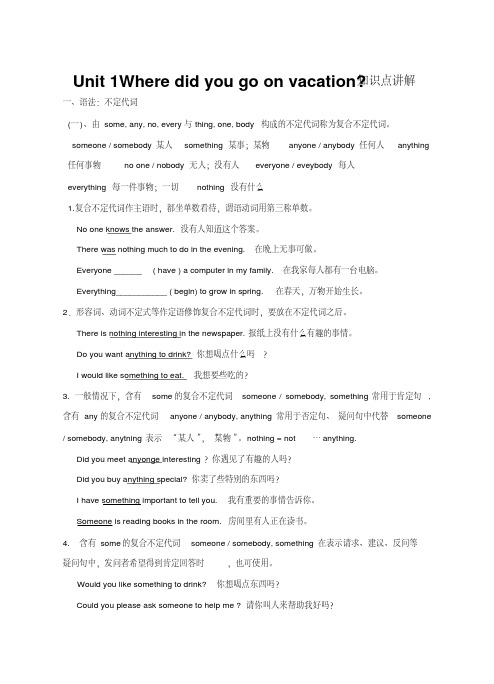
Unit 1Where did you go on vacation?知识点讲解一、语法:不定代词(一)、由some, any, no, every与thing, one, body 构成的不定代词称为复合不定代词。
someone / somebody 某人something 某事;某物anyone / anybody 任何人anything 任何事物no one / nobody 无人;没有人everyone / eveybody 每人everything 每一件事物;一切nothing 没有什么1.复合不定代词作主语时,都坐单数看待,谓语动词用第三称单数。
No one knows the answer. 没有人知道这个答案。
There was nothing much to do in the evening. 在晚上无事可做。
Everyone ______ ( have ) a computer in my family. 在我家每人都有一台电脑。
Everything___________ ( begin) to grow in spring. 在春天,万物开始生长。
2.形容词、动词不定式等作定语修饰复合不定代词时,要放在不定代词之后。
There is nothing interesting in the newspaper.报纸上没有什么有趣的事情。
Do you want anything to drink?你想喝点什么吗?I would like something to eat. 我想要些吃的?3. 一般情况下,含有some的复合不定代词someone / somebody, something常用于肯定句,含有any的复合不定代词anyone / anybody, anything常用于否定句、疑问句中代替someone / somebody, anytning表示“ 某人”,“某物”。
新人教版八年级英语上册复习短语笔记资料Unit 1 Where did you go on vacation
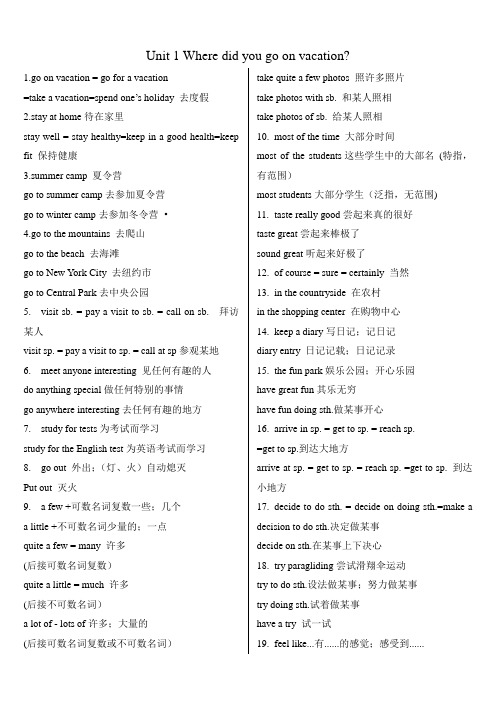
Unit 1 Where did you go on vacation?1.go on vacation = go for a vacation=take a vacation=spend one’s holiday 去度假2.stay at home待在家里stay well = stay healthy=keep in a good health=keep fit 保持健康3.summer camp 夏令营go to summer camp去参加夏令营go to winter camp去参加冬令营•4.go to the mountains 去爬山go to the beach 去海滩go to New York City 去纽约市go to Central Park去中央公园5. visit sb. = pay a visit to sb. = call on sb. 拜访某人visit sp. = pay a visit to sp. = call at sp参观某地6. meet anyone interesting 见任何有趣的人do anything special做任何特别的事情go anywhere interesting去任何有趣的地方7. study for tests为考试而学习study for the English test为英语考试而学习8. go out 外出;(灯、火)自动熄灭Put out 灭火9. a few +可数名词复数一些;几个a little +不可数名词少量的;一点quite a few = many 许多(后接可数名词复数)quite a little = much 许多(后接不可数名词)a lot of - lots of许多;大量的(后接可数名词复数或不可数名词)take quite a few photos 照许多照片take photos with sb. 和某人照相take photos of sb. 给某人照相10. most of the time 大部分时间most of the students这些学生中的大部名(特指,有范围)most students大部分学生(泛指,无范围)11. taste really good尝起来真的很好taste great尝起来棒极了sound great听起来好极了12. of course = sure = certainly 当然13. in the countryside 在农村in the shopping center 在购物中心14. keep a diary写日记;记日记diary entry 日记记载;日记记录15. the fun park娱乐公园;开心乐园have great fun其乐无穷have fun doing sth.做某事开心16. arrive in sp. = get to sp. = reach sp.=get to sp.到达大地方arrive at sp. = get to sp. = reach sp. =get to sp. 到达小地方17. decide to do sth. = decide on doing sth.=make a decision to do sth.决定做某事decide on sth.在某事上下决心18. try paragliding尝试滑翔伞运动try to do sth.设法做某事;努力做某事try doing sth.试着做某事have a try 试一试19. feel like...有......的感觉;感受到......20. have something very special 吃一些非常特别的东西ride bikes to Georgetown 骑自行车去乔治敦21. from 100 years ago 自一百年以前in the past在过去in the past few years在过去几年里22. enjoy doing sth.享受/喜欢做某事enjoy oneself = have a good time= have fun =have a fun time玩得开心;过得愉快23. make a difference=play an important role有影响;起(重要)作用24. walk up to..朝......走过去walk back home步行回家walk to school步行上学25. wait for…等待wait for sb. to do sth.等待某人去做某事26. rain hard = rain heavily 下大雨rain cats and dogs下倾盆大雨27. because of +名词/动名词因为......because +从句因为......28. another two hours = two more hours 再过两小时29. make notes=take notes做记录;做笔记30. each other互相(用于两者之间)one another互相(用于三者或三者以上)31. at the airport 在机场at the station 在车站32. on one’s way home在某人回家的路上on one ‘ s way to school在某人上学的路.33. bring back 带回来34. on our school trip 在我们学校郊游的旅途中go on a trip=travel to sp.去旅行35. find out查明;弄清楚36. keep doing sth.继续做某事;一直做某事不停地做某事;持续做某事37. go on继续往前走;继续;发生go on doing sth.继续做同一件事go on to do sth.继续做另一件事go on with sth.继续某事38. up and down上上下下;来回;到处;彻底地39. in excitement 兴奋地in surprise = surprise sb.=to one’s surprise惊讶地40. come up上升,升起;靠近,走近;长出41. forget about sth.忘了某事forget to do sth.忘记去做某事forget doing sth.忘记做过某事。
最新人教新目标英语八年级上册 Unit 1 Where did you go on vacation?单元知识归纳

Unit 1 Where did you go on vacation?单元知识目标突破词汇SectionAanyone pron.任何人→P3SectionBfeel like给……的感觉;感受到→P10quite a few 相当多;不少→P3building n.建筑物;房子→P10wonder v. 想知道;琢磨→P11most adj.,adv. &pron. 最多;大多数→P4difference n.差别;差异→P11wait v.&n. 等待;等候→P12 seem v. 好像;似乎;看来→P4because of 因为→P12bored adj. 厌倦的;烦闷的→P5below prep.&adv. 在……下面;到……下面→P13SectionBactivity n. 活动→P9enough adj. 足够的;充足的;充分的→P13 decide v. 决定;选定→P9try v.& n. 尝试;设法;努力→P9dislike v.&n.不喜爱;厌恶→P14把握句型1.I felt like I was a bird.我感觉像是一只鸟。
feel like后接的是宾语从句。
2.I wonder what life was likehere in the past.我很想知道过去这儿的生活是什么样的。
注意wonder的用法。
3.What a difference a day makes!一天的差别有多大!注意感叹句。
4.And because of the badweather,we couldn't seeanything below.因为这恶劣天气,我们看不到下面的任何景色。
注意because of的运用。
熟悉语法学习不定代词的用法。
规则动词和不规则动词的过去式。
学会交际学会询问度假情况的交际用语。
写作练笔记叙假期发生的事情。
课文翻译Section A 2dRick:Hi,Helen. Long time no see.Helen:Hi,Rick. Yes,I was on vacation last month.Rick:Oh,did you go anywhere interesting?Helen:Yes,I went to Guizhou with my family.Rick:Wow!Did you see Huangguoshu Waterfall?Helen:Yes,I did. It was wonderful!①We took quite a few photos there. What about you?Did you do anything special last month?Rick:Not really.②I just stayed at home most of the time to read and relax.,里克:你好,海伦。
人教版八年级上册英语Unit 1 Where did you go on vacation?

Unit 1 Where did you go on vacation?Period 1Section A 1a~1cI. Teaching Aims:1. Talk about travel activities correctly using “where” and “how”.2. Ask and answer questions about the things in the past using the past tense.3. Record a vacation in a form of a diary and express their feelings about thevacation.4. Get to know more about each other through the exchange of what they have seen,heard and felt.II. Analysis of the students:1.学生在上学期已接触过一般过去时,具有了学习本单元知识的认知前提,能自然地与本单元话题进行衔接。
2.八年级学生思想活跃,善于和同学交流,乐于表达自己。
我在教学活动中尽量考虑学生的实际情况,由浅到深,让他们参与到活动中来,有更多的机会来说英语。
通过学生间的合作学习,降低他们的学习难度,使他们体验到成功的喜悦,使各层次的学生都有所收获。
III. Important and difficult points:1. Vocabulary2. Useful expressions: Where did you go on vacation?I went to summer camp.e the past tense to talk about past events in English.IV. Teaching procedures:The First Period教学活动活动一【导入】lead in教师活动1. Play a show with two hand puppets and ask:What are they talking about?2. Sing an English song and ask:♥ Did you have a nice holiday?♥ What did you do on your vacation?1. Sing an English song together.2. Use the past tense to say something about their vacation activities. 媒体应用1. 用白板展示课题、图片及文字。
人教新目标八年级上册英语《Unit 1 Where did you go on vacation?》

人教新目标八年级上册英语《Unit 1 Where did you go on vacation?》Section B_教学设计1一. 教材分析人教新目标八年级上册英语《Unit 1 Where did you go on vacation?》Section B 主要讲述了假期旅行的主题。
通过本节课的学习,学生能够掌握一般过去时的疑问句和回答,以及如何描述过去发生的事情。
教材内容贴近学生的生活,激发学生对旅行的兴趣,提高学生的口头表达能力。
二. 学情分析八年级的学生已经掌握了基本的英语语法知识,具有一般现在时和一般过去时的基础。
在学习本节课之前,学生已经学习了如何用英语描述家庭成员和询问他们的去向。
因此,学生在学习本节课时,能够将已有的知识与新的知识相结合,提高学习效果。
三. 教学目标1.知识目标:–能够听懂、说出一般过去时的疑问句和回答。
–能够用英语描述过去发生的事情。
2.能力目标:–能够与他人用英语交流关于假期旅行的经历。
–能够提高口头表达能力。
3.情感目标:–激发学生对旅行的兴趣,拓宽视野。
–培养学生的团队协作精神。
四. 教学重难点•一般过去时的疑问句和回答。
•如何用英语描述过去发生的事情。
•一般过去时疑问句的构成和用法。
•如何在实际交流中运用一般过去时。
五. 教学方法1.情境教学法:通过设置旅行相关的情境,让学生在实际语境中学习英语。
2.交际法:鼓励学生参与课堂互动,提高学生的口头表达能力。
3.任务型教学法:通过小组合作完成任务,培养学生的团队协作精神。
六. 教学准备1.教学课件:制作与旅行相关的课件,包括图片、视频等。
2.教学道具:准备一些与旅行相关的实物道具,如地图、行李箱等。
3.小组活动准备:划分学习小组,提前分配任务。
七. 教学过程1.导入(5分钟)–教师展示一张旅行图片,引导学生谈论旅行的话题。
–学生分享自己最喜欢的旅行地点和经历。
2.呈现(10分钟)–教师通过课件呈现一般过去时的疑问句和回答。
新人教版八年级英语上册unit1 where did you go on vacation单元分析+教案

Unit1 Where did you go on vacation?单元分析一、教材分析Unit1 Where did you go on vacation?的核心话题为“Talking about holidays, vacations and past events”,主要描述有关假期等过去的事情,学习和运用一般过去时,使学生学会谈论和交流过去发生的事情,让学生在交际活动中学会如何正确用英语谈论自己及询问他人过去的事情与经历,重在培养学生的语言运用能力、实践能力、合作能力及创新意识。
二、教学目标1.知识目标:1) 掌握并能灵活运用本单元出现的重点词汇。
动词及它的过去式:stay(ed), visit(ed), go(went), do(did), is/am(was)2)用“Where did you go...? Did you...?”询问他人过去的经历。
3)掌握以下句式:(1)— Where did sb. go (on vacation)?—Sb.+ went to … (on vacation).(2)— What did sb. do (on vacation)?—Sb. +verb + ed … (on vacation).(3)一般过去时的应用。
2.能力目标:学会谈论发生在过去的事情;能听懂以谈论假期做过的事情和谈论过去的事件及自己的感想为话题的语言材料,并获取相关信息。
能以“Talking about holidays and vacations”,“Talking about past events”为话题与他人进行交流;能利用该话题进行情景对话及角色表演。
3.情感目标:本单元的教学内容与学生的实际生活息息相关,容易激发学生的兴趣,从而乐于运用简单的英语与他人进行交流。
学习活动中学生通过交换对过去发生的事情的描述及看法,从而促进学生之间和师生之间的情感交流,增进友谊。
三、重点和难点1. 一般过去时及其应用。
unit1 Where did you go on vacation重点精讲 人教版英语八年级上册

八上unit1 Where didi you go on vacation重点精讲重点语法精讲一、一般过去时1.动词过去式的拼写规则1).动词过去式规则变化:2).动词过去式的不规则变化:2.一般过去时结构:do 肯定句否定句一般疑问句1)肯定句:“主语+动词的过去式+其他.”I helped him to carry the heavy box last week.我上周帮他搬了这个重盒子2)否定句:“主语+did not (didn't)+动词原形+其他.”I did not (didn't) walk to school today.我今天没有走路上学。
3)一般疑问句:“Did+主语+动词原形+其他?”肯定回答:“Yes, 主语+did.”否定回答:“No, 主语+didn't.”-Did you go to the party last night?-Yes, I did./No, I didn't.—你昨晚去派对了吗?—是的,我去了。
/不,我没去。
二、复合不定代词的用法1.指物的复合不定代词1)分类something某物,anything任何事物,nothing没东西,everything 每件事;一切2)用法复合不定代词只具有名词性质,用作单数,在句中可用作主语、宾语和表语。
Everything begins to grow in spring. 春天万物开始生长了。
Something is wrong with my watch. 我的手表坏了。
I can’t see anything. 我什么也没看见。
带some的一般用于肯定句,而带any的一般用于否定句和疑问句题any在肯定句中意为“任何一个”;它们的用法同some、any的用法类似。
2.复合不定代词的特殊用法①用在表示“请求”、“建议”或希望得到对方肯定答复的疑问句中,some不用变为any。
英语人教版八年级上册语法GF汉语
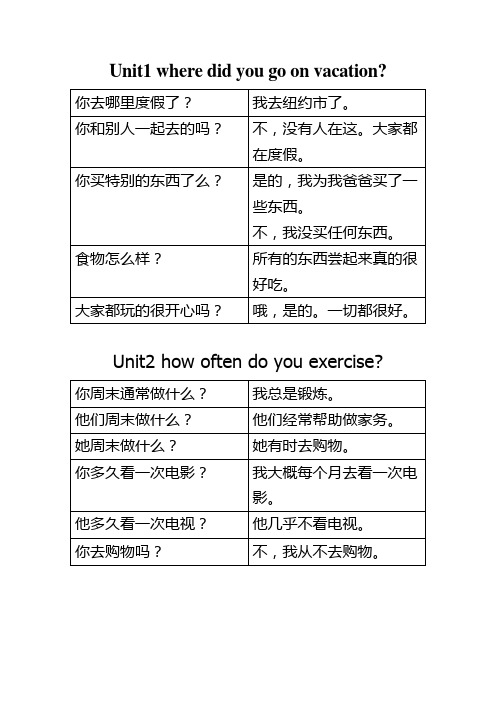
Unit10 if you go to the party, you’ll have a great time.
我想我将乘公共汽车去参加聚会。
如果你那做的话,你将会迟到。
我想我将待在家里。
如果你那样做的话,你将会很遗憾。
如果他们今天举行聚会,将会发生什么?
如果他们今天举行聚会,一半的同学将不会来。
不,我不想看。
今晚你打算看什么?
我打算看《我们过去的日子》。
你可以期待从情景喜剧中学到什么?
你可以学到一些很棒的笑话。
你为什么喜欢看新闻节目?
因为我希望弄清世界各地正在发生的事情。
你认为访谈节目怎么样?
我不介意它们。
我不能忍受它们!
我喜欢看它们!
Unit6i′m going to study computer science.
不,他们不会了。一切都将是免费的。
世界将会和平吗?
是的,我希望如此。
孩子们将在家里通过电脑学习。
他们将不会用去上学。
Unit8 how do you make a banana milk shake?
你怎样做香蕉奶昔?
首先
然后,把牛奶倒入食物搅拌器里。
最后,打开食物搅拌器。
Unit9 can you come to my party?
周六你能来参加我的聚会吗?
当然了,我愿意去。
对不起,我必须备考数学。
明天晚上你能去看电影吗?
当然。那听起来很棒。
恐怕不能。我得了流感。
他能去参加聚会吗?
不,他不能。他不得不帮助他的父母。
她能去看棒球比赛吗?
不,她没有空。她必须去看医生。
他们能去看电影吗?
人教版八年级英语上册:Unit1Wheredidyougoonvacation-讲义(含答案)

学科:英语专Unit 1 Where did you go on vacati on题:题一题面---Did you go to Guizhou with ______ ?---Yes, I went there with my family.A. some oneB. anyoneC. every oneD. no one复合不定代词指代人:some one, anyone, no one, every one,somebody, an ybody, n obody, everybody指代事物:someth ing, anything, nothing, everyth ing用something, anything, nothing, everything 填空。
---Is there ___________ on my no se?---Yes, there is ____________on your no se. Its a fly! anything何时用于肯定句?You can ask me anything you want to know.当形容词修饰不定代词时……---Come here, I ' II tell you something interesting.---Did you buy anything special?---Yes, I bought a pet spider.---Did you see _____ in your class?---No, I know all of them.A. some one newB. new some one题二题面I _________________ my uncle on vacation.我在假期去看望了叔叔。
I visit my grandparents once a week. 我每周都去爷爷奶奶一次。
- 1、下载文档前请自行甄别文档内容的完整性,平台不提供额外的编辑、内容补充、找答案等附加服务。
- 2、"仅部分预览"的文档,不可在线预览部分如存在完整性等问题,可反馈申请退款(可完整预览的文档不适用该条件!)。
- 3、如文档侵犯您的权益,请联系客服反馈,我们会尽快为您处理(人工客服工作时间:9:00-18:30)。
Unit 1 单元测试Ⅰ.单项选择。
(15’)1. —Where did you go ________ vacation, Alice? —I went to Hong Kong ________ my parents.A. in;withB. on;fromC. with;onD. on;with2. —________ did you go to Central Park, Mike? —By car.A. HowB. WhenC. WhereD. Why3. Bob likes reading. He spends ________ of his free time reading books.A. fewB. anyC. littleD. most4.(贵港中考)—Did you go ________last summer holiday? —Yes.I went to Shanghai Disney.A. somewhere specialB. anywhere specialC. special somewhereD. special anywhere5.—________ was your vacation? —Excellent.A. WhatB. WhereC. WhenD. How6.—Who taught ________ Japanese? —Nobody. I just learned it by ________.A. your;myselfB. you;IC. yours;meD. you;myself7. The old man bought ________ umbrella in the shop.A. aB. anC. theD. /8. —The weather was really cold yesterday. —Yes. It was five ________ zero last night.A. underB. belowC. downD. between9. It's spring now, so we decide ________ to the mountains.A. to goingB. goingC. to goD. go10.(2019·柳州改编)Lily enjoys ________ a film at the weekend.A. seeB. to seeC. seeingD. sees11.The key was on the table. The little boy was not ________to get it.A. tall enoughB. short enoughC. enough tallD. enough short12.She's very busy because she has ________ books to read.A. too muchB. too manyC. much tooD. many too13. —________ kind boy he is! —Yes, he always helps others.A. WhatB. What aC. How aD. How14. —I ________ what your favorite sport is. —Basketball.A. thinkB. tryC. wishD. wonder15. —Do you have ________ to say for yourself? —No. I have ________ to say.A. something;everythingB. nothing;somethingC. anything;nothingD. everything;anythingⅡ.完形填空。
(20’)David and Frank camped out with their parents. They went to the lake by car. And it took __1__ two hours to get there. When they got there, they were __2__ to see the green trees and the beautiful lake. The house near the lake looked nice. They would live in it __3__ two days.When their parents unloaded(卸货) the car, the children ran to the lake.“Don't get into the __4__ before we come, ” the father and the mother shouted together.“All right, ” they answered and __5__ their parents.After their parents joined them, they __6__ for a long time. Then they felt __7__ and went back to have some food. Though(尽管) the rooms were small, their beds were comfortable(舒适的). They __8__ well at night.The next day, they woke up early and looked outside. They __9__ their parents walking around the lake. They got up quickly and ran outside to play.The children liked __10__ there. They had a good time.1. A. us B. them C. you D. him2. A. sad B. tired C. angry D. happy3. A. at B. in C. for D. between4. A. lake B. mountain C. house D. car5. A. played with B. woke up C. waited for D. shouted to6. A. drew B. jumped C. swam D. slept7. A. full B. cold C. hungry D. shy8. A. worked B. woke C. helped D. slept9. A. tried B. saw C. learned D. followed10. A. nothing B. anyone C. everything D. everyoneⅢ.阅读理解。
(10’)Do you know something about the holiday camps in Hong Kong? The students in Hong Kong used to take part in an English holiday camp in their holidays. And their parents weren't with them, although they were very young.Now they still enjoy taking part in many kinds of holiday camps without their parents. Many parents let their children take part in some kinds of holiday camps in order to learn some practical knowledge in their life. And also learn some knowledge about living skills, science, reading and writing… The most important for the children is to learn to look after themselves.Holiday camps in Hong Kong are not so expensive. Most of families can afford to send their children there for further study, for making their bodies strong. And the government never charges (收费) for them.It is said that students in Hong Kong have much knowledge about many things. Perhaps it has something with the kinds of holiday camps.1. When students in Hong Kong are in the holiday camps, their parents _____.A. have to look after them nearB. don’t go with themC. must stay at homeD. can take part in other camps2. What does the underlined word mean?A. 实用的B. 高难度的C. 易操作的D. 开放的3. The most important thing for the students to take part in the holiday camps in Hong Kong is _____.A. to learn some knowledge in likeB. to learn about living and learning skillsC. to learn to look after themselvesD. to practice spoken English4. The cost to take part in a holiday camps is _____.A. very highB. not fairC. lowD. free5. What’s the main idea of the passage?A. The importance of knowledge.B. The holiday activities.C. The English study.D. The holiday camps in Hong Kong.Ⅳ.任务型阅读。
